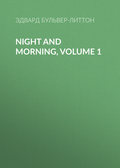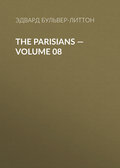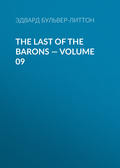
Эдвард Бульвер-Литтон
"My Novel" — Complete
CHAPTER VII
Now from that day the humble Lenny and the regal Violante became great friends. With what pride he taught her to distinguish between celery and weeds,—and how proud too was she when she learned that she was useful! There is not a greater pleasure you can give children, especially female children, than to make them feel they are already of value in the world, and serviceable as well as protected. Weeks and months rolled away, and Lenny still read, not only the books lent him by the doctor, but those he bought of Mr. Sprott. As for the bombs and shells against religion which the tinker carried in his bag, Lenny was not induced to blow himself up with them. He had been reared from his cradle in simple love and reverence for the Divine Father, and the tender Saviour, whose life beyond all records of human goodness, whose death beyond all epics of mortal heroism, no being whose infancy has been taught to supplicate the Merciful and adore the Holy, yea, even though his later life may be entangled amidst the thorns of some desolate pyrrhonism, can ever hear reviled and scoffed without a shock to the conscience and a revolt of the heart. As the deer recoils by instinct from the tiger, as the very look of the scorpion deters you from handling it, though you never saw a scorpion before, so the very first line in some ribald profanity on which the tinker put his black finger made Lenny’s blood run cold. Safe, too, was the peasant boy from any temptation in works of a gross and licentious nature, not only because of the happy ignorance of his rural life, but because of a more enduring safeguard,—genius! Genius, that, manly, robust, healthful as it be, is long before it lose its instinctive Dorian modesty; shamefaced, because so susceptible to glory,—genius, that loves indeed to dream, but on the violet bank, not the dunghill. Wherefore, even in the error of the senses, it seeks to escape from the sensual into worlds of fancy, subtle and refined. But apart from the passions, true genius is the most practical of all human gifts. Like the Apollo, whom the Greek worshipped as its type, even Arcady is its exile, not its home. Soon weary of the dalliance of Tempe, it ascends to its mission,—the Archer of the silver bow, the guide of the car of light. Speaking more plainly, genius is the enthusiasm for self-improvement; it ceases or sleeps the moment it desists from seeking some object which it believes of value, and by that object it insensibly connects its self-improvement with the positive advance of the world. At present Lenny’s genius had no bias that was not to the Positive and Useful. It took the direction natural to its sphere, and the wants therein,—namely, to the arts which we call mechanical. He wanted to know about steam-engines and Artesian wells; and to know about them it was necessary to know something of mechanics and hydrostatics; so he bought popular elementary works on those mystic sciences, and set all the powers of his mind at work on experiments.
Noble and generous spirits are ye, who, with small care for fame, and little reward from pelf, have opened to the intellects of the poor the portals of wisdom! I honour and revere ye; only do not think ye have done all that is needful. Consider, I pray ye, whether so good a choice from the tinker’s bag would have been made by a boy whom religion had not scared from the Pestilent, and genius had not led to the self-improving. And Lenny did not wholly escape from the mephitic portions of the motley elements from which his awakening mind drew its nurture. Think not it was all pure oxygen that the panting lip drew in. No; there were still those inflammatory tracts. Political I do not like to call them, for politics means the art of government, and the tracts I speak of assailed all government which mankind has hitherto recognized. Sad rubbish, perhaps, were such tracts to you, O sound thinker, in your easy-chair! or to you, practised statesman, at your post on the Treasury Bench; to you, calm dignitary of a learned Church; or to you, my lord judge, who may often have sent from your bar to the dire Orcus of Norfolk’s Isle the ghosts of men whom that rubbish, falling simultaneously on the bumps of acquisitiveness and combativeness, hath untimely slain! Sad rubbish to you! But seems it such rubbish to the poor man, to whom it promises a paradise on the easy terms of upsetting a world? For, ye see, those “Appeals to Operatives” represent that same world-upsetting as the simplest thing imaginable,—a sort of two-and-two-make-four proposition. The poor have only got to set their strong hands to the axle, and heave-a-boy! and hurrah for the topsy-turvy! Then just to put a little wholesome rage into the heave-a-hoy! it is so facile to accompany the eloquence of “Appeals” with a kind of stir-the-bile-up statistics,—“Abuses of the aristocracy,” “Jobs of the Priesthood,” “Expenses of the Army kept up for Peers’ younger sons,” “Wars contracted for the villanous purpose of raising the rents of the landowners,”—all arithmetically dished up, and seasoned with tales of every gentleman who has committed a misdeed, every clergyman who has dishonoured his cloth; as if such instances were fair specimens of average gentlemen and ministers of religion! All this, passionately advanced (and, observe, never answered, for that literature admits no controversialists, and the writer has it all his own way), may be rubbish; but it is out of such rubbish that operatives build barricades for attack, and legislators prisons for defence.
Our poor friend Lenny drew plenty of this stuff from the tinker’s bag. He thought it very clever and very eloquent; and he supposed the statistics were as true as mathematical demonstrations.
A famous knowledge-diffuser is looking over my shoulder, and tells me, “Increase education, and cheapen good books, and all this rubbish will disappear!” Sir, I don’t believe a word of it. If you printed Ricardo and Adam Smith at a farthing a volume, I still believe that they would be as little read by the operatives as they are nowadays by a very large proportion of highly-cultivated men. I still believe that, while the press works, attacks on the rich and propositions for heave-a-hoys will always form a popular portion of the Literature of Labour. There’s Lenny Fairfield reading a treatise on hydraulics, and constructing a model for a fountain into the bargain; but that does not prevent his acquiescence in any proposition for getting rid of a National Debt, which he certainly never agreed to pay, and which he is told makes sugar and tea so shamefully dear. No. I tell you what does a little counteract those eloquent incentives to break his own head against the strong walls of the Social System,—it is, that he has two eyes in that head which are not always employed in reading. And having been told in print that masters are tyrants, parsons hypocrites or drones in the hive, and landowners vampires and bloodsuckers, he looks out into the little world around him, and, first, he is compelled to acknowledge that his master is not a tyrant (perhaps because he is a foreigner and a philosopher, and, for what I and Lenny know, a republican). But then Parson Dale, though High Church to the marrow, is neither hypocrite nor drone. He has a very good living, it is true,—much better than he ought to have, according to the “political” opinions of those tracts! but Lenny is obliged to confess that if Parson Dale were a penny the poorer, he would do a pennyworth’s less good; and comparing one parish with another, such as Rood Hall and Hazeldean, he is dimly aware that there is no greater CIVILIZER than a parson tolerably well off. Then, too, Squire Hazeldean, though as arrant a Tory as ever stood upon shoe-leather, is certainly not a vampire nor blood sucker. He does not feed on the public; a great many of the public feed upon him: and, therefore, his practical experience a little staggers and perplexes Lenny Fairfield as to the gospel accuracy of his theoretical dogmas. Masters, parsons, and landowners! having, at the risk of all popularity, just given a coup de patte to certain sages extremely the fashion at present, I am not going to let you off without an admonitory flea in the ear. Don’t suppose that any mere scribbling and typework will suffice to answer the scribbling and typework set at work to demolish you,—write down that rubbish you can’t; live it down you may. If you are rich, like Squire Hazeldean, do good with your money; if you are poor, like Signor Riccabocca, do good with your kindness.
See! there is Lenny now receiving his week’s wages; and though Lenny knows that he can get higher wages in the very next parish, his blue eyes are sparkling with gratitude, not at the chink of the money, but at the poor exile’s friendly talk on things apart from all service; while Violante is descending the steps from the terrace, charged by her mother-in-law with a little basket of sago, and such-like delicacies, for Mrs. Fairfield, who has been ailing the last few days.
Lenny will see the tinker as he goes home, and he will buy a most Demosthenean “Appeal,”—a tract of tracts, upon the propriety of Strikes and the Avarice of Masters. But, somehow or other, I think a few words from Signor Riccabocca, that did not cost the signor a farthing, and the sight of his mother’s smile at the contents of the basket, which cost very little, will serve to neutralize the effects of that “Appeal” much more efficaciously than the best article a Brougham or a Mill could write on the subject.
CHAPTER VIII
Spring had come again; and one beautiful May day, Leonard Fairfield sat beside the little fountain which he had now actually constructed in the garden. The butterflies were hovering over the belt of flowers which he had placed around his fountain, and the birds were singing overhead. Leonard Fairfield was resting from his day’s work, to enjoy his abstemious dinner, beside the cool play of the sparkling waters, and, with the yet keener appetite of knowledge, he devoured his book as he munched his crusts.
A penny tract is the shoeing-horn of literature! it draws on a great many books, and some too tight to be very useful in walking. The penny tract quotes a celebrated writer—you long to read him; it props a startling assertion by a grave authority—you long to refer to it. During the nights of the past winter, Leonard’s intelligence had made vast progress; he had taught himself more than the elements of mechanics, and put to practice the principles he had acquired not only in the hydraulical achievement of the fountain, nor in the still more notable application of science, commenced on the stream in which Jackeymo had fished for minnows, and which Lenny had diverted to the purpose of irrigating two fields, but in various ingenious contrivances for the facilitation or abridgment of labour, which had excited great wonder and praise in the neighbourhood. On the other hand, those rabid little tracts, which dealt so summarily with the destinies of the human race, even when his growing reason and the perusal of works more classical or more logical had led him to perceive that they were illiterate, and to suspect that they jumped from premises to conclusions with a celerity very different from the careful ratiocination of mechanical science, had still, in the citations and references wherewith they abounded, lured him on to philosophers more specious and more perilous. Out of the tinker’s bag he had drawn a translation of Condorcet’s “Progress of Man” and another of Rousseau’s “Social Contract.” Works so eloquent had induced him to select from the tracts in the tinker’s miscellany those which abounded most in professions of philanthropy, and predictions of some coming Golden Age, to which old Saturn’s was a joke,—tracts so mild and mother-like in their language, that it required a much more practical experience than Lenny’s to perceive that you would have to pass a river of blood before you had the slightest chance of setting foot on the flowery banks on which they invited you to repose; tracts which rouged poor Christianity on the cheeks, clapped a crown of innocent daffodillies on her head, and set her to dancing a pas de zephyr in the pastoral ballet in which Saint-Simon pipes to the flock he shears; or having first laid it down as a preliminary axiom that—
“The cloud-capped towers, the gorgeous palaces,
The solemn temples, the great globe itself,—
Yea, all which it inherit, shall dissolve,”
substituted in place thereof M. Fourier’s symmetrical phalanstere, or Mr. Owen’s architectural parallelogram. It was with some such tract that Lenny was seasoning his crusts and his radishes, when Riccabocca, bending his long dark face over the student’s shoulder, said abruptly,—
“Diavolo, my friend! what on earth have you got there? Just let me look at it, will you?”
Leonard rose respectfully, and coloured deeply as he surrendered the tract to Riccabocca.
The wise man read the first page attentively, the second more cursorily, and only ran his eye over the rest. He had gone through too vast a range of problems political, not to have passed over that venerable Pons Asinorum of Socialism, on which Fouriers and Saint-Simons sit straddling, and cry aloud that they have arrived at the last boundary of knowledge!
“All this is as old as the hills,” quoth Riccabocca, irreverently; “but the hills stand still, and this—there it goes!” and the sage pointed to a cloud emitted from his pipe. “Did you ever read Sir David Brewster on Optical Delusions? No! Well, I’ll lend it to you. You will find therein a story of a lady who always saw a black cat on her hearth-rug. The black cat existed only in her fancy, but the hallucination was natural and reasonable,—eh, what do you think?”
“Why, sir,” said Leonard, not catching the Italian’s meaning, “I don’t exactly see that it was natural and reasonable.”
“Foolish boy, yes! because black cats are things possible and known. But who ever saw upon earth a community of men such as sit on the hearth-rugs of Messrs. Owen and Fourier? If the lady’s hallucination was not reasonable, what is his who believes in such visions as these?”
Leonard bit his lip.
“My dear boy,” cried Riccabocca, kindly, “the only thing sure and tangible to which these writers would lead you lies at the first step, and that is what is commonly called a Revolution. Now, I know what that is. I have gone, not indeed through a revolution, but an attempt at one.”
Leonard raised his eyes towards his master with a look of profound respect and great curiosity.
“Yes,” added Riccabocca, and the face on which the boy gazed exchanged its usual grotesque and sardonic expression for one animated, noble, and heroic. “Yes, not a revolution for chimeras, but for that cause which the coldest allow to be good, and which, when successful, all time approves as divine,—the redemption of our native soil from the rule of the foreigner! I have shared in such an attempt. And,” continued the Italian, mournfully, “recalling now all the evil passions it arouses, all the ties it dissolves, all the blood that it commands to flow, all the healthful industry it arrests, all the madmen that it arms, all the victims that it dupes, I question whether one man really honest, pure, and humane, who has once gone through such an ordeal, would ever hazard it again, unless he was assured that the victory was certain,—ay, and the object for which he fights not to be wrested from his hands amidst the uproar of the elements that the battle has released.”
The Italian paused, shaded his brow with his hand, and remained long silent. Then, gradually resuming his ordinary tone, he continued,—
“Revolutions that have no definite objects made clear by the positive experience of history; revolutions, in a word, that aim less at substituting one law or one dynasty for another, than at changing the whole scheme of society, have been little attempted by real statesmen. Even Lycurgus is proved to be a myth who never existed. Such organic changes are but in the day-dreams of philosophers who lived apart from the actual world, and whose opinions (though generally they were very benevolent, good sort of men, and wrote in an elegant poetical style) one would no more take on a plain matter of life, than one would look upon Virgil’s Eclogues as a faithful picture of the ordinary pains and pleasures of the peasants who tend our sheep. Read them as you would read poets, and they are delightful. But attempt to shape the world according to the poetry, and fit yourself for a madhouse. The farther off the age is from the realization of such projects, the more these poor philosophers have indulged them. Thus, it was amidst the saddest corruption of court manners that it became the fashion in Paris to sit for one’s picture with a crook in one’s hand, as Alexis or Daphne. Just as liberty was fast dying out of Greece, and the successors of Alexander were founding their monarchies, and Rome was growing up to crush in its iron grasp all States save its own, Plato withdraws his eyes from the world, to open them in his dreamy “Atlantis.” Just in the grimmest period of English history, with the axe hanging over his head, Sir Thomas More gives you his “Utopia.” Just when the world is to be the theatre of a new Sesostris, the sages of France tell you that the age is too enlightened for war, that man is henceforth to be governed by pure reason, and live in a paradise. Very pretty reading all this to a man like me, Lenny, who can admire and smile at it. But to you, to the man who has to work for his living, to the man who thinks it would be so much more pleasant to live at his ease in a phalanstere than to work eight or ten hours a day; to the man of talent and action and industry, whose future is invested in that tranquillity and order of a State in which talent and action and industry are a certain capital,—why, Messrs. Coutts, the great bankers, had better encourage a theory to upset the system of banking! Whatever disturbs society, yea, even by a causeless panic, much more by an actual struggle, falls first upon the market of labour, and thence affects prejudicially every department of intelligence. In such times the arts are arrested; literature is neglected; people are too busy to read anything save appeals to their passions. And capital, shaken in its sense of security, no longer ventures boldly through the land, calling forth all the energies of toil and enterprise, and extending to every workman his reward. Now, Lenny, take this piece of advice. You are young, clever, and aspiring: men rarely succeed in changing the world; but a man seldom fails of success if he lets the world alone, and resolves to make the best of it. You are in the midst of the great crisis of your life; it is the struggle between the new desires knowledge excites, and that sense of poverty which those desires convert either into hope and emulation, or into envy and despair. I grant that it is an up-hill work that lies before you; but don’t you think it is always easier to climb a mountain than it is to level it? These books call on you to level the mountain; and that mountain is the property of other people, subdivided amongst a great many proprietors, and protected by law. At the first stroke of the pickaxe, it is ten to one but what you are taken up for a trespass. But the path up the mountain is a right of way uncontested. You may be safe at the summit, before (even if the owners are fools enough to let you) you could have levelled a yard. Cospetto!” quoth the doctor, “it is more than two thousand years ago since poor Plato began to level it, and the mountain is as high as ever!”
Thus saying, Riccabocca came to the end of his pipe, and stalking thoughtfully away, he left Leonard Fairfield trying to extract light from the smoke.







